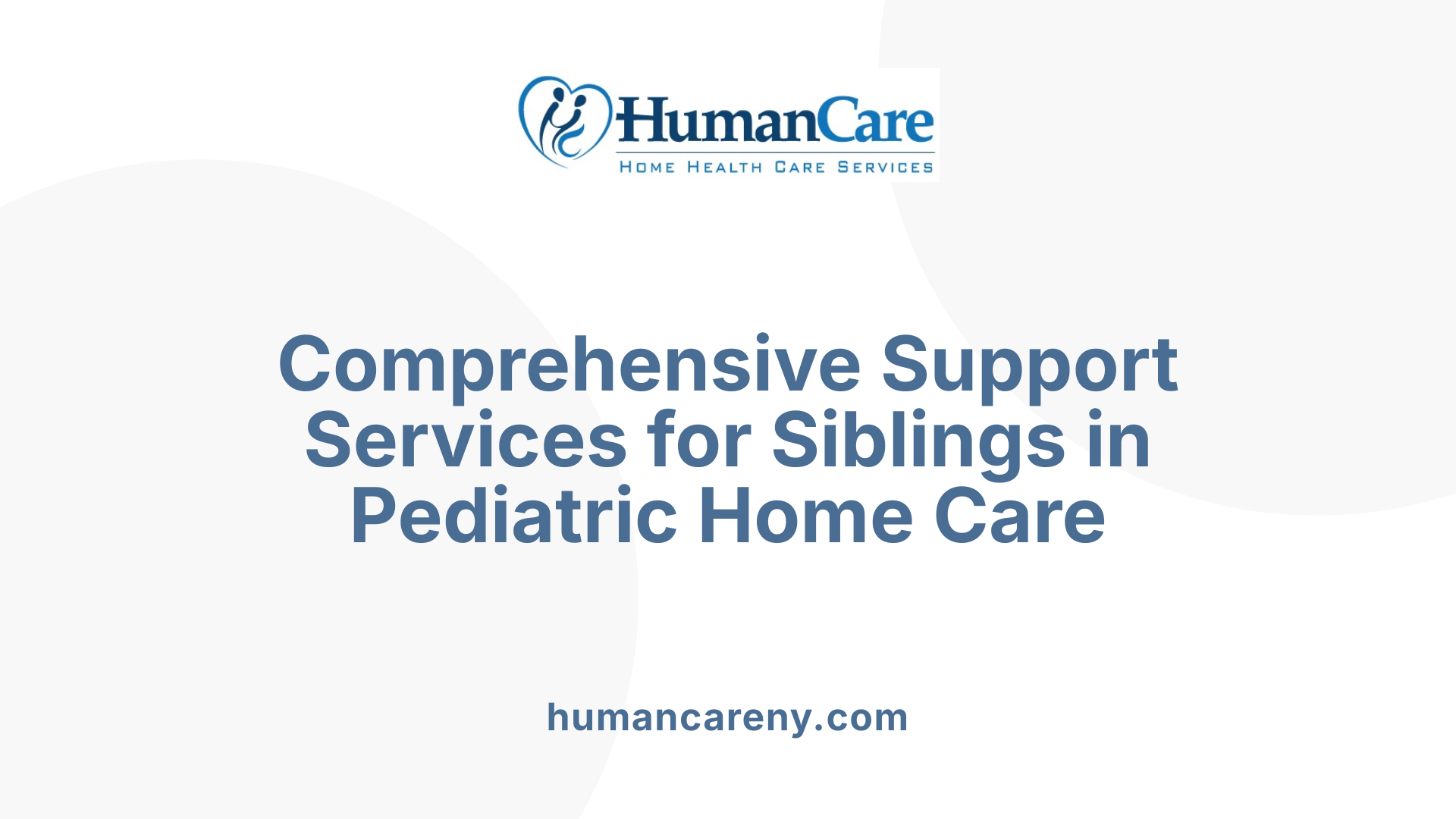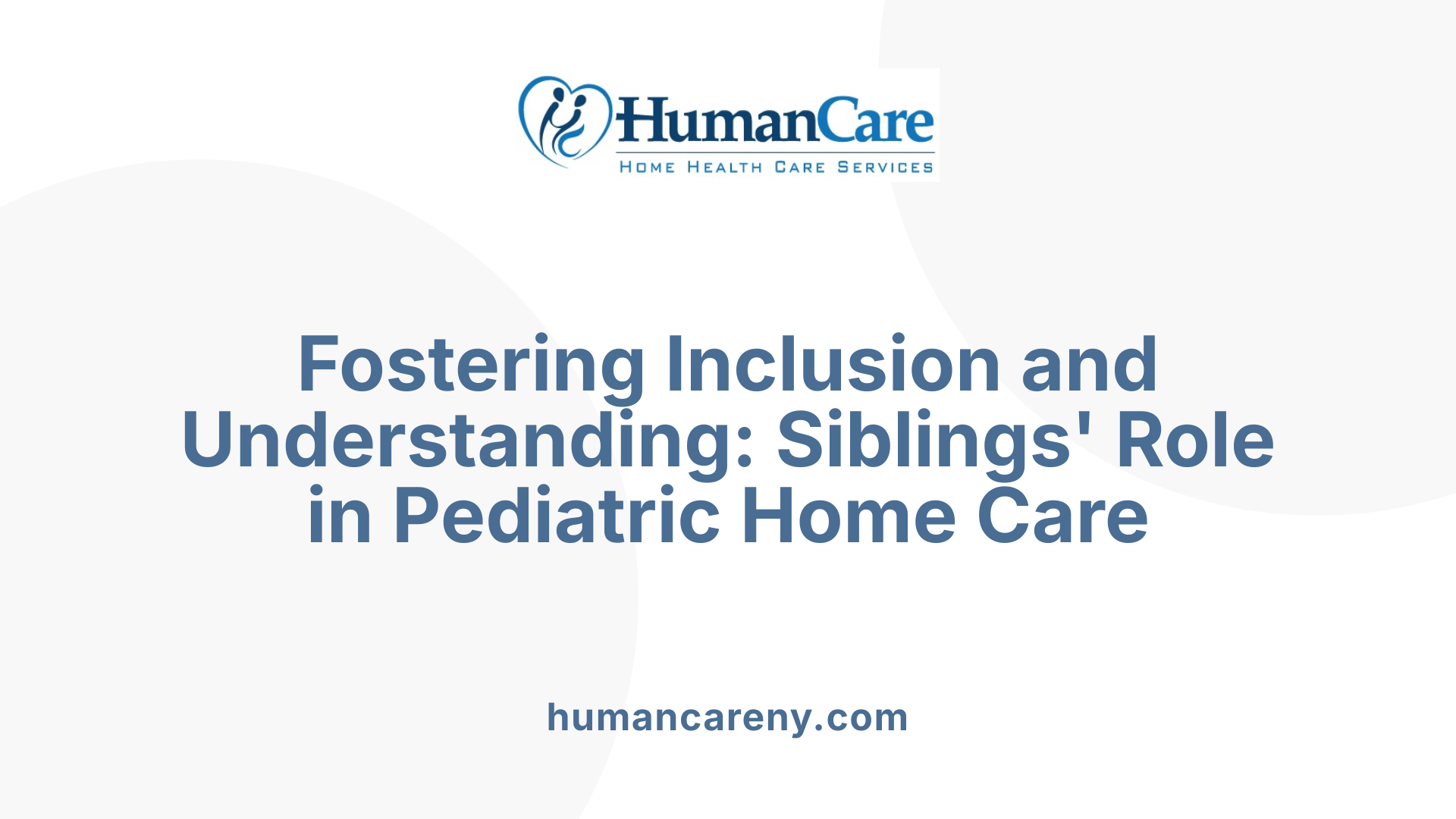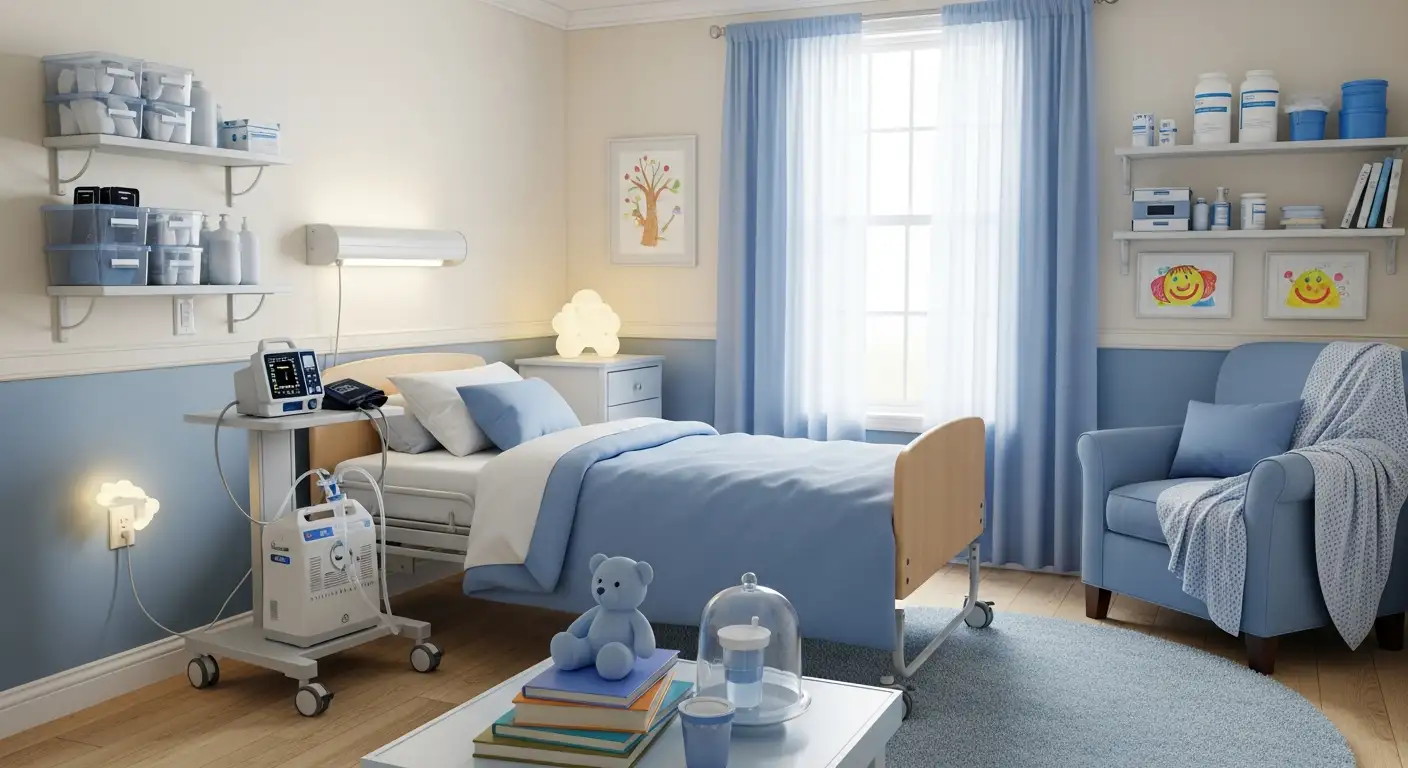Understanding the Vital Role of Siblings in Pediatric Home Care
Pediatric home care extends beyond the medically fragile child, encompassing the emotional and developmental needs of their siblings. Recognizing and supporting siblings is crucial for fostering family resilience, promoting healthy emotional well-being, and ensuring a comprehensive approach to family-centered care. This article explores the multifaceted role of pediatric home care in supporting siblings, highlighting family dynamics, support mechanisms, and practical strategies to enhance their experience.
Family Dynamics and Emotional Well-Being Impacted by Home Care Support

What aspects of family dynamics and emotional well-being are affected by pediatric home care for a child with health needs?
Pediatric home care can play a vital role in shaping family dynamics, especially for families with children who have ongoing medical needs. One of the primary ways it influences family life is through improving communication. Care teams often work with families to share information openly, explaining care routines and medical procedures in understandable ways. This transparency fosters trust and ensures all family members are informed and involved.
Shared responsibilities also tend to increase when families participate actively in their child's care plan. Parents, siblings, and caregivers collaborate to manage daily routines, medical schedules, and therapeutic activities. This shared effort can strengthen the family's bonds and create a sense of teamwork.
Emotionally, pediatric home care helps reduce stress and anxiety for families. Being in a familiar environment and having personalized care often provides a sense of security. Siblings, in particular, feel more at ease knowing their brother or sister is receiving tailored support at home. This environment supports emotional stability and helps children and their families cope better with the challenges of illness.
Supportive interactions promote resilience and positive emotional health. When families communicate effectively, share responsibilities, and foster emotional connections, they build a resilient foundation that can adapt to ongoing health issues. Conversely, poor communication or unresolved conflicts can lead to increased emotional distress, negatively affecting both the child's and family's mental health.
In summary, family-centered, trauma-informed care at home not only addresses medical needs but also nurtures healthier relationships. This holistic approach emphasizes positive interaction, cooperation, and emotional support, all crucial for better mental health outcomes and overall family resilience.
Involving Families in Pediatric Home Care to Support Siblings
How can family members be involved in pediatric home care to support siblings?
Family involvement in pediatric home care plays a crucial role in promoting the well-being of all children in the family. Active participation includes engaging in daily routines such as administering medications, managing medical devices, and assisting with therapies. By doing so, families help maintain a consistent treatment plan, which is vital for the child's health and recovery.
Beyond medical tasks, family members provide essential emotional support. Their presence and reassurance can greatly reduce feelings of anxiety and confusion among siblings, helping them adjust to the new family dynamics curiously and confidently. Open communication about the child's condition, tailored to the siblings’ ages, fosters understanding, normalizes the situation, and alleviates potential worries.
Moreover, involving siblings through age-appropriate activities like drawing, storytelling, or shared playtime helps them feel included and valued. This engagement not only strengthens their emotional resilience but also humanizes the care experience.
Families also serve as strong advocates within the healthcare system. They communicate effectively with doctors and nurses, ensuring that their child's unique needs are met, and resources are accessible. Participating in family-centered care discussions and developing personalized care plans with healthcare providers secures better support and services.
Support networks such as sibling groups or counseling programs empower families further. These resources offer peer support, coping strategies, and guidance, helping siblings process their feelings while maintaining a healthy family environment. Overall, active family involvement enhances the entire family's resilience, stability, and capacity to thrive amid ongoing medical needs.
Support Mechanisms and Services for Siblings in a Pediatric Home Care Setting

What support mechanisms are available for siblings within the pediatric home care setting?
Siblings of medically fragile children face complex emotions such as confusion, anger, guilt, and jealousy. To address these feelings, pediatric home care offers various support mechanisms tailored to their individual needs and developmental stages.
One of the primary approaches is family-centered intervention. This includes counseling services, either through mental health professionals or support groups, where siblings can express their emotions in a safe environment. Peer support groups, like the Sibling Support Program (SSP), connect siblings with others facing similar experiences, reducing feelings of isolation and allowing shared understanding.
Educational resources are also crucial. Informational materials and age-appropriate explanations help siblings understand their brother or sister’s health condition, normalizing their responses and reducing uncertainty.
Healthcare professionals and caregivers actively facilitate emotional expression through activities such as drawing, storytelling, or role-playing. These expressive therapies can help siblings process their feelings and build resilience.
Involving siblings in routine activities—like playing games, engaging in music, or participating in caregiving tasks—strengthens bonds and fosters a sense of contribution.
Regular assessment by the care team ensures support remains relevant as siblings grow and their needs change. This ongoing evaluation helps tailor interventions, ensuring emotional well-being and supporting healthy family dynamics.
Overall, these mechanisms aim to validate siblings’ feelings, promote adaptation to their family situation, and nurture a supportive environment, thereby enhancing their emotional health and strengthening family resilience.
Services and Resources to Assist Siblings in Pediatric Home Care

What services are available to support siblings within the pediatric home care setting?
In pediatric home care, supporting siblings includes a variety of services designed to address their emotional, educational, and social needs. Healthcare teams, such as nurses and Child Life Specialists, play a vital role by providing age-appropriate information about the child's medical condition. These sessions help siblings understand care procedures and clarify any fears or misconceptions they may have.
Families are encouraged to involve siblings in routine activities like drawing, storytelling, or games, which fosters a sense of involvement and normalcy. Open and honest communication about the child's health helps validate siblings' feelings of confusion, guilt, or jealousy and allows them to express concerns.
Peer support opportunities are an essential element of sibling care. Organizations like the Sibling Support Project and Teen Sibs offer platforms for siblings to share experiences, gain emotional support, and learn coping strategies. These groups promote a sense of belonging and help siblings realize they are not alone in their feelings.
Counseling services tailored for siblings are often integrated into broader family support initiatives. They provide a safe space to explore emotions and develop resilience. Activities such as expressive art, storytelling, or group therapy are employed to normalize emotional responses and build emotional strength.
Support programs also emphasize maintaining social connections and routine, which are critical for the sibling’s overall well-being. This comprehensive approach ensures siblings feel valued, understood, and supported throughout their brother or sister’s health journey.
Overview of support services for siblings in pediatric home care
| Service Type | Description | Additional Resources |
|---|---|---|
| Educational Programs | Teach siblings about medical conditions and care routines | Handouts, online resources, family meetings |
| Peer Support Opportunities | Connect siblings with others experiencing similar situations | Support groups, online forums |
| Counseling and Mental Health | Offer emotional support and coping strategies | Kids’ counseling, support hotlines |
| Expressive and Play Therapies | Facilitate emotional expression through art and storytelling | Art therapy, storytelling sessions |
This integrated array of services helps siblings thrive emotionally and socially, promoting a balanced family environment in pediatric home care.
The Crucial Role of Pediatric Home Care in Supporting Siblings

What is the role of pediatric home care in supporting siblings of medically fragile children?
Pediatric home care is essential in helping siblings navigate the challenges of living with a medically fragile brother or sister. It provides opportunities for siblings to learn about their sibling’s medical condition through education and age-appropriate explanations delivered by healthcare professionals. This understanding helps reduce confusion and fear, making family life more manageable.
In addition to educational support, home care teams actively involve siblings in daily routines and care activities when appropriate. Activities such as drawing, storytelling, playing games, or engaging in music foster a sense of inclusion and help siblings feel valued as part of the caregiving process.
Emotional validation is another vital aspect. Healthcare professionals and caregivers listen to siblings’ concerns, acknowledge their feelings, and provide comfort. This validation is crucial because siblings often experience complex emotions such as guilt, jealousy, anger, confusion, or fear. Addressing these feelings openly helps maintain emotional well-being.
Support services like sibling counseling and sibling support groups are also integrated into pediatric home care. These resources offer siblings a safe space to express themselves, share experiences, and learn coping strategies. Providing such comprehensive support promotes healthy emotional development.
Overall, pediatric home care fosters a supportive and understanding environment. It helps families maintain stability, nurtures positive sibling relationships, and ensures that the emotional and developmental needs of all children are recognized and met. This holistic approach benefits the entire family, promoting resilience and well-being during challenging times.
Addressing the Needs of Siblings with Long-Term Conditions and During Critical Illness

How does pediatric home care address the needs of siblings with long-term health conditions?
Pediatric home care plays a crucial role in supporting siblings of children with long-term health conditions by offering customized education, emotional support, and opportunities for active participation. Healthcare providers focus on family-centered care, ensuring that siblings understand their brother or sister’s condition through age-appropriate explanations. This helps reduce confusion and fear, fostering understanding and emotional safety.
Involving siblings in daily routines or caregiving activities encourages a sense of helpfulness and inclusion. For example, children might help set up medical supplies or participate in simple therapies, which builds confidence and normalizes their experience.
Creating safe spaces for open communication is essential. Pediatric home care teams facilitate conversations where siblings can express feelings like guilt, jealousy, or sadness without judgment. Peer support groups and therapeutic play activities further support emotional resilience, providing siblings with outlets to share their experiences and cope with complex emotions.
Support programs also address the emotional impacts of living with a sibling's chronic illness through counseling and group sessions. These interventions help normalize their reactions and strengthen family bonds.
Overall, ongoing assessment and personalized interventions are vital. They aim to foster a supportive environment, reduce stress, and promote psychosocial well-being. By prioritizing understanding and participation, pediatric home care ensures that siblings’ emotional and developmental needs are met alongside their brother or sister’s medical care.
Fostering Resilience and Emotional Stability in Family Care
Pediatric home care is instrumental in bolstering not only the medical health of vulnerable children but also in nurturing the emotional and developmental needs of their siblings. Through comprehensive support mechanisms, family involvement, tailored services, and ongoing assessment, home care creates a resilient family environment where all members can thrive. Prioritizing sibling well-being fosters healthier family dynamics, reduces trauma, and promotes long-term emotional stability. Encouraging community participation, peer support, and family-centered principles ensures that siblings receive ongoing encouragement and validation, ultimately strengthening the family unit and enhancing quality of life.
References
- The Role Siblings Play in Pediatric Home Care
- The Role of Pediatric Home Care in Family Support
- Supporting siblings during the critical illness hospitalization ...
- How Family Participation Improves Pediatric Home Health
- The experiences and perceptions of healthy siblings ...
- The Role of the Family in Pediatric Healthcare
- Pediatric Home Health Care — What You Need to Know
- Family experiences with palliative care for children at home
- 5 Heartwarming Ways Pediatric Home Care Nursing ...
- Home Care for Children in Need



